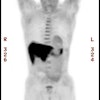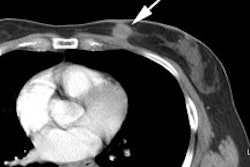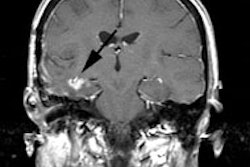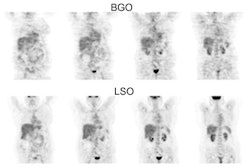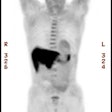11C-acetate PET imaging of prostate
cancer: detection of recurrent disease at PSA relapse.
Oyama N, Miller TR, Dehdashti F, Siegel BA, Fischer KC, Michalski JM, Kibel AS,
Andriole GL, Picus J, Welch MJ.
Patients with rising prostate-specific antigen (PSA) levels after definitive
local therapy of prostate carcinoma present a diagnostic dilemma. A local
recurrence would be amenable to additional local therapy with curative intent,
whereas metastatic disease would require palliative androgen ablation therapy.
In this study, we evaluated the effectiveness of PET with (11)C-acetate (AC PET)
for evaluation of patients with rising PSA after radical prostatectomy or
radiation therapy. We also compared the reliability of AC PET in detecting
recurrent prostate cancer with that of PET with (18)F-FDG. METHODS: Two groups
of patients with PSA recurrence were enrolled in this study: group A, 30
patients after prostatectomy, and group B, 16 patients after radiation therapy.
After administration of 1,110 MBq (30 mCi) of (11)C-acetate, whole-body PET
images were obtained. After allowing for (11)C decay, 555 MBq (15 mCi) of
(18)F-FDG were administered and repeated whole-body imaging was performed. The
PET findings were scored as positive or negative in each of the following
regions: prostatic bed, pelvic nodes, paraaortic nodes, and other sites (bone or
soft tissue). PET findings were correlated with those of CT, bone scintigraphy,
and biopsy. RESULTS: Twenty-seven of 46 AC PET studies (59%) had positive
findings, whereas only 8 (18)F-FDG PET studies had positive findings (17%).
Limiting the analysis to patients with findings confirmed by CT, bone
scintigraphy, or biopsy or considered highly likely to represent tumor, 14 (30%)
had disease identified by AC PET, whereas only 4 (9%) had disease identified by
(18)F-FDG PET. CT was performed on 22 patients and had positive findings in 3
(14%). Thirteen of 22 patients (59%) with serum PSA > 3 ng/mL had positive AC
PET findings, whereas only 1 of 24 patients (4%) with serum PSA levels < or = 3
ng/mL had positive findings. CONCLUSION: AC PET demonstrates marked uptake in
prostate cancer and has higher sensitivity than (18)F-FDG PET. These preliminary
data show that (11)C-acetate is a promising tracer for detection of recurrent
prostate cancer.
PET > PET tumor imaging > General
Latest in PET
PET > PET tumor imaging > Neuroendocrine tumors
April 14, 2021
PET > General > Images
January 23, 2018
PET > PET tumor imaging > Prostate cancer
January 20, 2016

